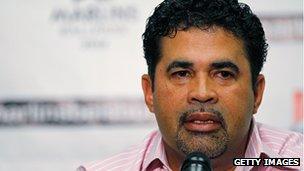How free speech can get you fired
- Published

Sometimes keeping your mouth shut is a wise course to take
In America, everyone has the right to free speech. But legally spoken remarks often have severe consequences - as the baseball coach who praised Fidel Castro has now discovered.
Ozzie Guillen, manager of the Miami Marlins baseball team, earned a five-game suspension after praising Fidel Castro in a <link> <caption>Time magazine interview</caption> <url href="http://www.time.com/time/magazine/article/0,9171,2110450,00.html" platform="highweb"/> </link> .
John Derbyshire, the conservative columnist, lost his job at the National Review after <link> <caption>publishing an article</caption> <url href="http://takimag.com/article/the_talk_nonblack_version_john_derbyshire#axzz1rg4kGEW1" platform="highweb"/> </link> warning his children to, among other things, avoid amusement parks with a high concentration of black visitors.
The first amendment to the US constitution protects the right to free speech, meaning Americans have the right to speak their mind.
"The courts take the position that this is the price of freedom," says free speech expert Craig Smith, of the California State University, Long Beach. As long as it is not personally defamatory, American speech is protected by law.
But those protections do not always matter in the workplace, where a tension exists between what is allowed by law and what will lead to disapproval, disciplinary action - or simply to the sack.
So what does it take for one's legally protected speech to be deemed professionally dangerous? We asked three experts.
1. Push the envelope.
Despite the vast protections around free speech in the courts, the court of public opinion is less kind.

Ozzie Guillen has apologised for his remarks
"There's always been some sort of uneasiness with unpopular viewpoints, or fringe viewpoints, or offensive viewpoints," says Roy Gutterman, professor of communications law at Syracuse University.
"We're always dealing with tension surrounding language or concepts or ideas that are really on the fringes of propriety."
Where those fringes lie depend on who you are.
"People don't listen to Howard Stern for the weather," says Ronn Torossian, boss of 5WPR, a company that specialises in crisis communication.
Stern's listeners expect the "shock-jock" to make inflammatory comments, and are not shocked when he does. But news personalities, baseball managers or politicians do not have that freedom - and are held to a harsher standard.
"Rule number one is use common sense," he says.
2. Pick the wrong place, and the wrong time
"You have you to be dumb to speak in favour of Castro in Miami. If he would have done it in Denver, the hoopla would not have been the same," says Mr Torossian.
Meanwhile, Mr Derbyshire has <link> <caption>gone on the record</caption> <url href="http://collectedmiscellany.com/2003/11/an-interview-with-john-derbyshire/" platform="highweb"/> </link> in the past as saying he was a "mild and tolerant" racist, but the scope of the offending column, which took the form of a list of pieces of advice he has given his teenage children, had an impact.
"We should always be this heightened to racist remarks," says Dr Smith. In the wake of the killing of Florida teenager Trayvon Martin, he notes, Americans are especially sensitive and more likely to pick up on outlandish statements.
3. Hurt your employer
It is possible to be guilty of steps one and two but still remain employed, but rule number three is a deal-breaker: do not say anything that will hurt your employer's bottom line.
"If you hurt my business, you're not going to work for me anymore," says Mr Torossian. If Marlins fans organise boycotts of the team as a result of Ozzie Guillen's comments, the coach will be facing much more than a five-game suspension, he says.
The damage can also be to the reputation of a business. Rich Lowry, editor of the National Review, noted that Derbyshire was being fired because "Derb is effectively using our name to get more oxygen for views with which we'd never associate ourselves otherwise."
4. Betray your audience
Earlier this year, radio host Rush Limbaugh called a women's health advocate a "slut," saying: "If we are going to pay for your contraceptives, and thus pay for you to have sex... we want you to post the videos online so we can all watch."
The comments lead to a fierce online boycott, with over 40 companies pulling their advertising from Limbaugh's radio show. Despite the outrage against Rush Limbaugh's statements, he is still broadcasting.
That is because the people who were offended by his comments were not, for the most part, loyal listeners. His fan base was enthused, rather than outraged, by his comments and by the criticism that followed.
"Politicians need 51% of the market. Limbaugh doesn't need 51%. If he gets 10%, 21%, he's a king," says Mr Torossian. "Who cares if you don't like him. His fan base is loyal."
A loyal enough base can even overcome short-term economic damage (see rule 3). If the fans remain long after the offended parties move on, the advertisers will stay - and so will the host.
5. Establish a pattern
Even those who have cultivated a loyal following and a lucrative business as a verbal flame-thrower are not immune to penalty. Say too many beyond-the-pale comments and eventually it catches up to you.
Witness Don Imus, the beloved radio shock-jock who lost his job in 2009. When discussing the members of a women's college basketball team, Mr Imus described them as "nappy-headed hos".
"Don Imus used to say all sorts of offensive stuff, and it all caught up with him," says Mr Gutterman. "Sometimes it's cumulative."